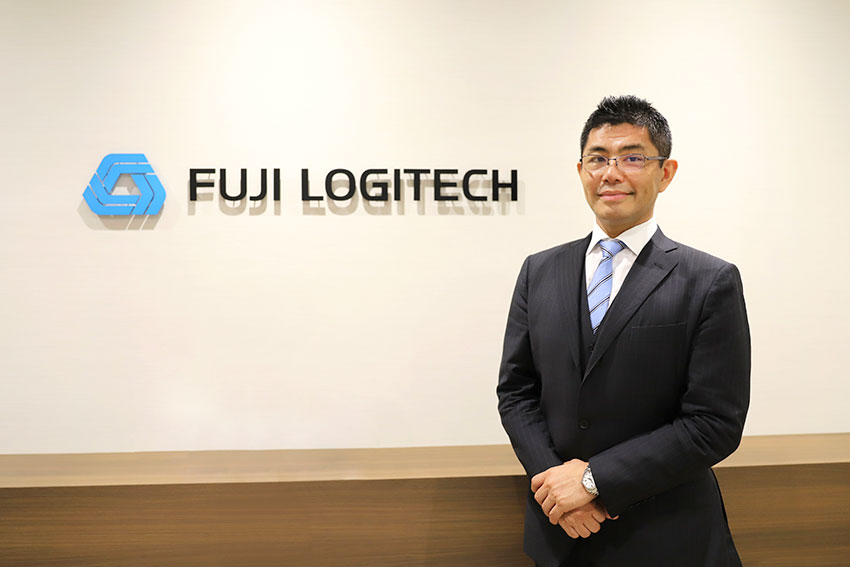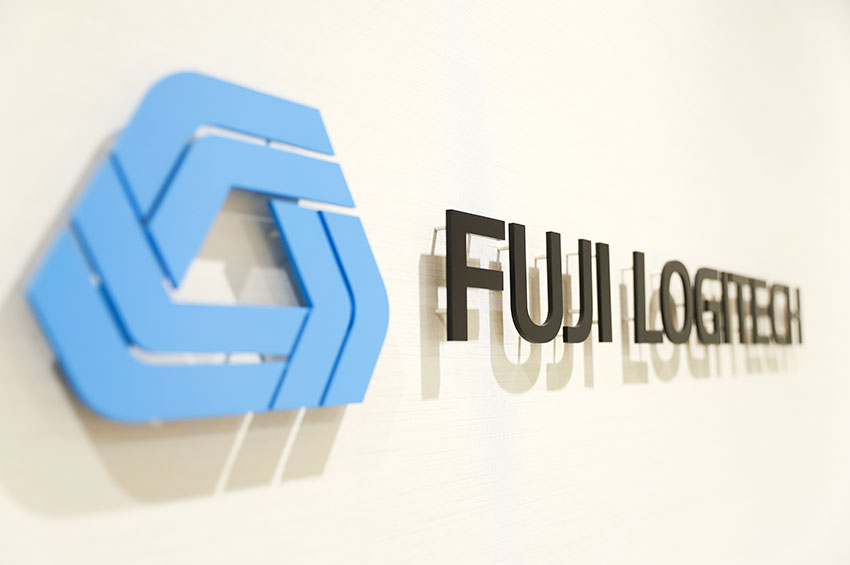

We sat down with president Suzuki of Fuji Logitech to discuss the impact of the coronavirus pandemic on the global supply chain, how logistics can be more sustainable, and their unique approach to a more efficient supply chain.

The last two years in the wake of Covid have seen some major disruptions to global supply chains with issues such as quarantine, container availability, a rise in oil prices, and the war in Ukraine. Can you tell us about the impact that these disruptions have had on your business? What has been your strategy to compensate for and overcome these obstacles?
The two years of supply chain disruptions affected our business in many ways, including higher costs due to soaring oil prices and losses due to our inability to deliver packages to our customers.
At the same time, our customers and companies recognized that logistics is a cost, and it remained difficult for us to pass on all of our burdens to them.
We recognize that our business is a "social infrastructure business," and therefore we believe that our company's continued existence is necessary for society. That is why we tried to attempt this difficult situation by devising low-cost, low-energy consumption measures, but as a result, we ended up drawing down our internal reserves.
This experience reminded us that the conventional social model of unlimited expansion is unsustainable.
However, even under these difficult circumstances, we believe that our strategy does not need to be changed because the essence of our logistics company remains the same.
You spoke about the need for a more sustainable model. A lot of the talk about this new model in recent times has also been around China’s role within the global supply chain, especially in Asia. China is the manufacturing hub of the world. With the coronavirus pandemic now coming to an end, we are seeing that while countries are opening, China is continuing its zero-Covid policy. The Shanghai lockdown had a catastrophic influence on the automotive field. Some interviewees have argued this represents an opportunity for Japan to take traffic away from China. This is also happening at a time when the Japanese Yen is very low in relation to the US dollar. It is making exporting from Japan cheaper. Do you agree with that argument?
That opinion may be correct.
However, for us, it is more important to be sustainable in the long term than to adapt to short-term global conditions, and we believe that supply chain management is the answer to this question.
Let me tell you how we came to this idea.
The earthquake disaster and the difficulties (illnesses) of people close to me led me to think from the perspective of the entire planet.
The earth's resources are limited, and we must face these constraints if we are to continue to live on the earth.
Often the argument is that "logistics emits CO2 and exhaust gases."
However, we have come to realize that logistics itself is an activity to face these constraints and to use resources more efficiently. Logistics is often thought of as destroying the environment by running large numbers of trucks, but this is not the case.
Rather than 100 consumers driving 100 passenger cars to pick up vegetables at the production center, it is more rational and efficient to transport the vegetables in one truck and deliver them to the consumers.
We came to the conclusion that being able to provide more optimal logistics solutions on a global scale would benefit our customers and lead to global sustainability, and we named this idea "Global Supplychain Engennering (GSE)" and made it our company motto.
You talked about one of the legacies of Covid as being the imperative of creating a more sophisticated and efficient supply chain management. This has mirrored your own transformation from a 3PL into a global supply chain engineering (GSE) company. Can you tell us a little more about what it means to be a GSE company? How is your company different from a conventional 3PL?
GSE is a philosophy that we hold dear to our hearts.
3PL is a logistics service that attempts to realize the optimal form for the requested transportation of goods. However, if we want to contribute to our customers in a more advanced way, we need to propose solutions for the entire supply chain, such as where to transport the goods from and where to transport them to, and whether it is necessary to transport the goods in the first place. In this case, the person to whom we make proposals is not the person in charge of logistics, but the CxO, the manager of the company. We are the decision support staff for the CxOs, and we need to be their agents in the operation of the system.
From a bird's-eye view, this kind of supply chain optimization leads to the elimination of wasteful use of the earth's resources. This is also linked to the ancient Japanese wisdom of "mottainai," or "waste not, waste not.
We call it "GSE," and we are constantly striving to become a consultant to our customers' management teams and to make proposals that contribute to minimizing the waste of the earth's resources.
Our company began as a warehousing company.

For a long time, we did business as a single-function warehousing company, but when I became president, I brought about a number of changes and worked to expand our service areas.
We have expanded our business domain by focusing on BPO (Business Process Outsourcing), such as taking care of not only cargo storage, but also services related to the inspection of goods and procedures related to customs clearance.
We have also been developing supply chain tools for our customers to visualize information and fulfill all reporting functions.
By resolving the cumbersome tasks of our customers on our end, they can focus on their core business. This is one example of how GSE is a partner for our customers by solving higher-level problems.
We also took the idea of "mottainai" and created the "rental uniform service" and the "cargo seeking service.
In the rental uniform service, customers with employee uniforms, such as fast food chains, are given an ID for each uniform, and the warehouse system manages the rental destination and status (returned, being cleaned, etc.). This not only contributes to brand management for customers, but also saves costs and resources in the form of reusing uniforms.
Cargo seeking service provides a system whereby trucks that return to the office with empty beds after delivery are introduced to customers who want to move their loads in the same direction. This not only contributes to the sales of delivery companies, but also saves costs and resources in the form of reduced truck miles traveled by society as a whole.
I think these are examples of how we have expanded our business domain through BPO based on the concept of "GSE.
In order to embody "GSE" in this way, I believe there are important elements.
First, we must have a global perspective in order to make the most optimal proposals on the planet.
Second, we must always explore the possibility of partnership and collaboration, as we cannot achieve this on our own.
Finally, to make full use of technology in order to provide services at a higher speed and with more labor and energy savings.
Another legacy of Covid has been the popularization of e-commerce. You just mentioned the importance of creating a strong platform. Your recent Lexica is a great example of this. We read in a press release this month that Lexica is a service to help people who are conducting e-commerce platforms handle decentralized inventory management and shipping. Can you tell us more about the impact of the popularization of e-commerce on your business, but also about Lexica, and how it demonstrates your philosophy?
The proliferation of e-commerce has led to improvements in peripheral services, allowing sellers to deliver products to customers without having to manage inventory and shipping procedures themselves. This has made it easier for small businesses to launch e-commerce businesses, which were previously difficult to enter.
We have also gained new customers in various industries, such as apparel and cosmetics, and this has given us many ideas on how logistics should be done in the future.
As the volume of transactions increased, handling returns of defective products became a heavy burden for small businesses. There were no services available to outsource that much, and the only option was to sell products on the major platforms (Rakuten and Amazon). However, this was an option with disadvantages, such as high royalties paid to the platform and the inability to obtain customer data themselves.
Lexica is a system set up to provide a platform to support small businesses that want to work on reverse logistics, so that they can complete everything from conventional logistics to handling returns on their own e-commerce sites, without having to rely on major platforms. Lexica is a system set up to provide a platform for supporting businesses.
Lexica is an embodiment of GSE's vision, and we believe that our partners' participation in Lexica will help us realize our vision.
When it comes to your international development, you have had operations in Shanghai for some time, as well as Los Angeles. In this interview, you made two important points clear. The first is the need to have a global perspective, and the second is the importance of partnerships and collaboration. Could you tell us about your international development strategy?
At the moment, we have only two overseas branches, in Shanghai and Los Angeles, but we have been able to build an extensive agency network. We use this network to provide transportation services, customs clearance, DC management, and supply chain management. We also work with procurement partners; for example, we work with the procurement partner of an American supermarket chain.
In addition, we have a partnership with FIEGE, a German logistics company. This partnership has allowed us to develop a direct route from Osaka to Switzerland and also to expand our business in Europe. We value this partnership very highly.
We believe that partnerships are important to compensate for the lack of financial resources and expertise when comparing our company with global companies.
As a "Global Supply chain Engineer" acting on behalf of our clients, we also believe that it is necessary to develop partners who can execute a wide international network, diverse services, and transportation modes with high quality on a daily basis in order to instantly understand and realize the intentions of CxOs.
You mentioned earlier that your business originally started with warehousing, and that you brought many changes to the company. Can you highlight for us the key changes that you brought to Fuji Logitech? What other changes would you like to bring in the future?
I engaged in activities to remind employees once again of the meaning of their work.
When I took office as president, I felt that our employees lacked energy and motivation.
However, over our long history, we have built up the trust of our clients. It is precisely because of this trust that we receive the work we are asked to do, but our employees were unaware of this trust.
I have been conveying this thought to our employees, hoping that they will have more confidence and be aware of the trust that we have built up because we are doing important work that supports society.
I am convinced that the logistics industry has supported society up to now and will continue to support society in the future.
Based on my past experience and through collaboration with domestic and overseas partners, I would like to put "GSE" into practice on a more global scale.
Based on our mission that logistics is an indispensable and unchanging social infrastructure business, we will continue to do logistics forever.
0 COMMENTS